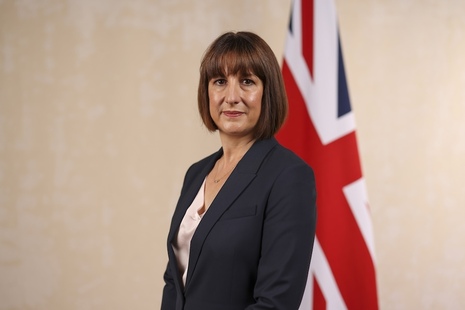The government has officially launched its new National Wealth Fund.
The move sees officials begin work to align the existing UK Infrastructure Bank (UKIB) and the British Business Bank just a day after Rachel Reeves announced plans for the fund in her first speech as chancellor.
£7.3 billion of additional funding will be allocated for the fund through the UKIB so that investments can be made immediately.
The chancellor also announced reforms for the British Business Bank, which is currently overseen by the Department for Business and Trade.
The government says that these reforms will help to mobilise the UK's institutional capital by "harnessing its pipeline of investments".
Reeves and Ed Miliband, who is the country's new energy security and net zero secretary, joined a meeting with the National Wealth Fund Taskforce on Tuesday as part of the launch.
Chaired by the Green Finance Institute, the Taskforce includes former Bank of England governor Mark Carney; Barclays chief executive C.S Venkatakrishnan; and Aviva chief executive Dame Amanda Blanc, as well as large institutional investors.
Miliband put forward a particular focus on green investments, with the energy secretary saying that the Fund would help drive the government's mission to make the UK a "clean energy superpower".
He went on to say that the Fund would help create thousands of jobs in clean energy industries and help to tackle climate change.
The Taskforce also announced its ambition to allow for the review and potential simplification for existing development institutions.
Taskforce member Barclays' Venkatakrishnan welcomed this proposal in particular, saying that a move like this could make it easier for the bank's corporate and business clients to access the partnership finance necessary to get infrastructure and other net zero projects off the ground.
The Investment Association, which represents 250 investment management firms in the UK, also praised the proposal and described the National Wealth Fund as a "clear signal" that the government intends to mobilise the "much needed" capital for green investment.
"There is also significant merit to the National Wealth Fund Taskforce’s recommendation to review and simplify the landscape of UK development investment organisations to ensure that they can deliver effectively on their shared missions," said Chris Cummings, chief executive, Investment Association. "Industry and government collaboration will be critical to achieving this, and is something we strongly endorse.”
Naureen Zahid, director of investor relations at early-stage venture capital investor OpenOcean, said that it was reassuring that the government has resolved any confusion between the UKIB and the National Wealth Fund.
Earlier this week, Zahid expressed concerns about a "striking similarity" between the two structures.
But the director said that it is essential that Labour provides clear differentiation and streamlined operations to avoid "bureaucratic redundancies" that could hamper the fund’s effectiveness.
Latest News
-
Gemini to cut quarter of workforce and exit UK, EU and Australia as crypto slump forces retrenchment
-
Bank ABC’s mobile-only ila bank migrates to core banking platform
-
Visa launches platform to accelerate small business growth in US
-
NatWest to expand Accelerator programme to 50,000 members in 2026
-
BBVA joins European stablecoin coalition
-
eToro partners with Amundi to launch equity portfolio with exposure to ‘megatrends’
Creating value together: Strategic partnerships in the age of GCCs
As Global Capability Centres reshape the financial services landscape, one question stands out: how do leading banks balance in-house innovation with strategic partnerships to drive real transformation?
Data trust in the AI era: Building customer confidence through responsible banking
In the second episode of FStech’s three-part video podcast series sponsored by HCLTech, Sudip Lahiri, Executive Vice President & Head of Financial Services for Europe & UKI at HCLTech examines the critical relationship between data trust, transparency, and responsible AI implementation in financial services.
Banking's GenAI evolution: Beyond the hype, building the future
In the first episode of a three-part video podcast series sponsored by HCLTech, Sudip Lahiri, Executive Vice President & Head of Financial Services for Europe & UKI at HCLTech explores how financial institutions can navigate the transformative potential of Generative AI while building lasting foundations for innovation.
Beyond compliance: Building unshakeable operational resilience in financial services
In today's rapidly evolving financial landscape, operational resilience has become a critical focus for institutions worldwide. As regulatory requirements grow more complex and cyber threats, particularly ransomware, become increasingly sophisticated, financial services providers must adapt and strengthen their defences. The intersection of compliance, technology, and security presents both challenges and opportunities.
© 2019 Perspective Publishing Privacy & Cookies













Recent Stories